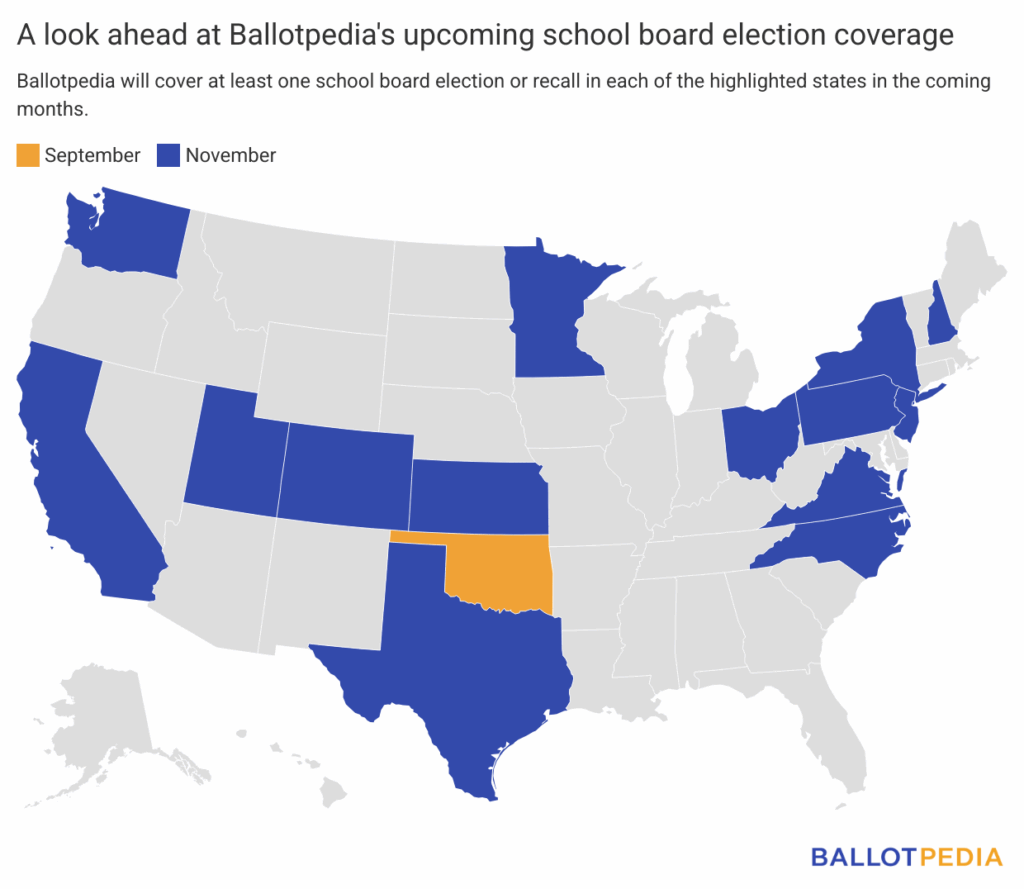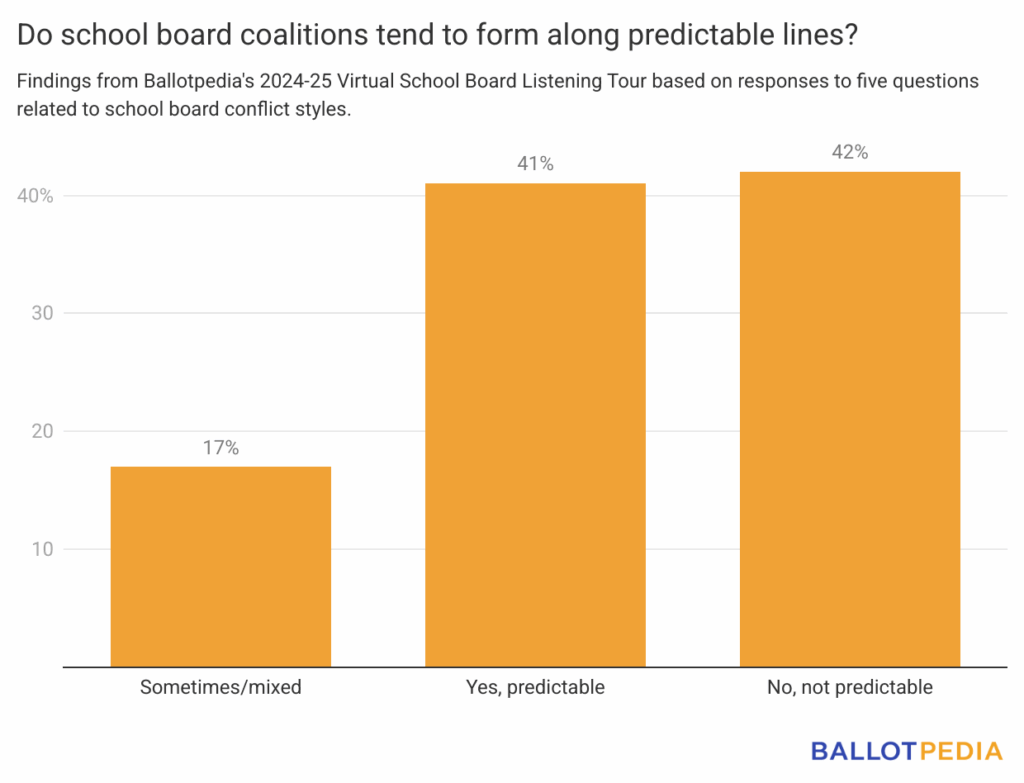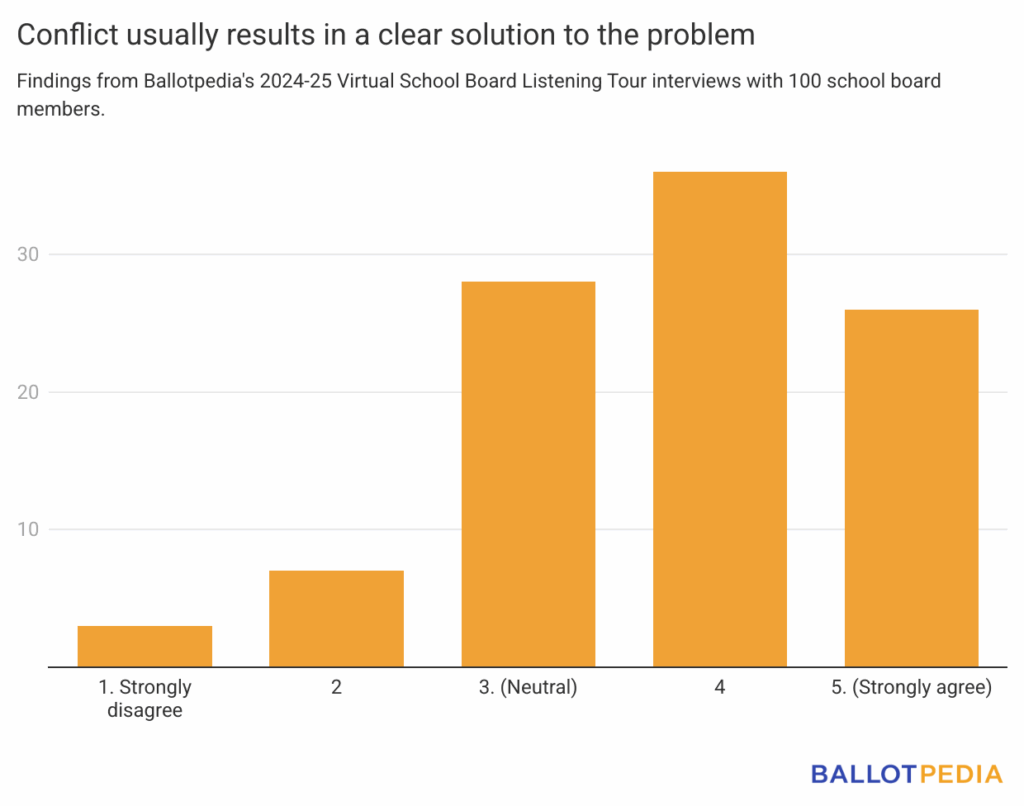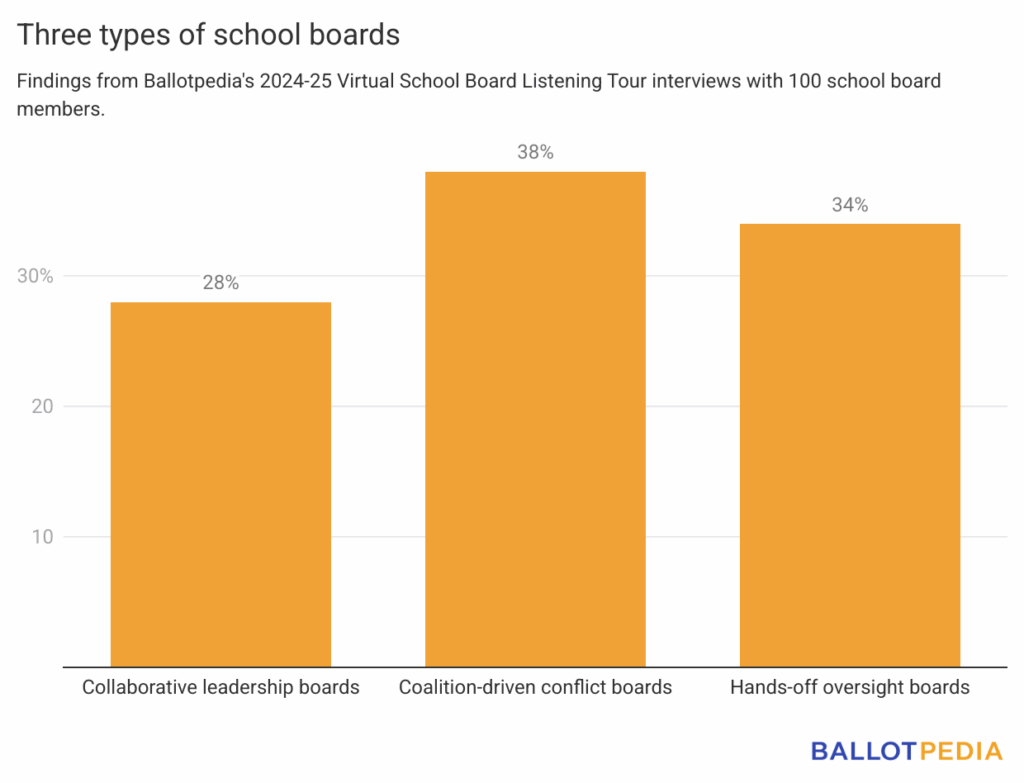Welcome to Hall Pass, a newsletter written to keep you plugged into the conversations driving school board governance, the politics surrounding it, and education policy.
In today’s edition, you’ll find:
- On the issues: The debate over the Classic Learning Test
- School board filing deadlines, election results, and recall certifications
- We spoke to school board members nationwide about their roles—here's what they told us
- Extracurricular: education news from around the web
- Candidate Connection survey
Reply to this email to share reactions or story ideas!
On the issues: The debate over the Classic Learning Test
In this section, we curate reporting, analysis, and commentary on the issues school board members deliberate when they set out to offer the best education possible in their district. Missed an issue? Click here to see the previous education debates we’ve covered.
Launched in 2015, the Classic Learning Test (CLT) is an alternative to standardized college admissions tests like the SAT and the ACT. The company Classic Learning Initiatives, which developed the exam, describes it as being “aligned with a classic approach to education.” According to a press release, “The CLT’s reading passages are sourced from classic texts of philosophy, science, and literature — from Plato to Fredrick Douglass, from Isacc Newton to Albert Einstein. And the CLT Quantitative Reasoning section has a rigorous focus on complex arithmetic, geometry, and trigonometry, with no calculators allowed.”
Classic Learning Initiatives says more than 300 colleges accept the CLT. In 2023, the Florida Board of Governors, which oversees the state’s network of public universities, voted to approve the use of the CLT scores in admissions. Since then, Texas, Oklahoma, Arkansas, and Wyoming have all expanded the use of the test for admissions and state-sponsored scholarships.
Education researcher Daniel Buck argues that tests shape curricula, and that the ACT and the SAT promote an uninspiring vision of education that focuses too narrowly on practical skills. He says the CLT, in drawing on the Western tradition, engages students’ hearts and minds imore deeply and puts pressure on the ACT and SAT to update their unimaginative tests. In 2024, the Iowa Board of Regents’ Academic Affairs Committee studied the CLT and recommended against including it in the state’s Regent Admission Index, which is used to evaluate applications to the state’s public universities, until more data becomes available. The committee said the test’s recent introduction means there is little data on whether colleges can use CLT scores to predict student success. The committee said administrators would struggle to use the scores to determine student placement in math and English courses, as ACT and SAT scores are used.
A test to challenge the SAT | Daniel Buck, The Hill
“Created in 2015, the CLT hopes to revive what we consider an education of old — logic, grammar, Shakespeare, Tolstoy. In format, it resembles its competitors, featuring passages with multiple choice questions. Yet students instead read the likes of Plato on tyrannical man or St. Teresa of Avila on the virtues of a humble life.
“It’s a simple albeit powerful innovation on a well-established format. While the SAT and ACT compete, they resemble each other too closely to foster innovation. Like two fast food behemoths shoveling buckets of fries, they may not feel pressure from a new steakhouse to change their menus, but it will at least provide a much-needed alternative.
“If the SAT and ACT alone maintain their prominence, schools have no choice but to malform themselves to comply with their dictates. Tests are the measure of achievement, and so in place of logic, literature, rhetoric, and discipline, schools advance utilitarian, factory-model education.”
Classic Learning Test Review | Iowa Board of Regents, Academic Affairs Committee
“To date, the team has identified no peer-reviewed journal articles addressing the relationship to student outcomes, and the CLT technical guide does not include any study of the relationship between the CLT or its subscales and student outcomes. The relative youth of the CLT does not allow for a robust study of student learning outcomes or retention to graduation. Additionally, any studies released in the immediate future will be limited to students at private, primarily religiously affiliated institutions of higher education. Even with the recent acceptance of CLT as an admissions test at the University of New Mexico, all public institutions in Florida, and select other public institutions, any study related to student outcomes at public colleges and universities will not happen for years.
“The team identified no evidence that a criterion score from the CLT could be used for placement purposes for students in mathematics or English courses as is current practice with the SAT and ACT. The inability to use CLT for course placement is problematic.”
School board update: filing deadlines, election results, and recall certifications
In 2025, Ballotpedia will cover elections for more than 30,000 school board seats. We’re expanding our coverage each year with our eye on covering the country’s more than 80,000 school board seats.

The next major wave of school board elections will occur on Election Day, Nov. 4, in at least 14 states. Stay tuned for more on Ballotpedia’s coverage of November school board elections.
We spoke to school board members nationwide about their roles—here's what they told us
In 2024 and 2025, Ballotpedia staff spoke with 100 school board members in 33 states about their motivations for running for elected office and their experiences managing their districts.
What was the goal of these wide-ranging, hour-long conversations? We wanted to learn more about the people who occupy these positions of community trust so that we can be sure our coverage of their elections serves their communities. Our conversations included school board members from small and large districts, as well as those in rural and urban areas.
The resulting 43-page report details board member perspectives on conflict resolution, academic oversight, community engagement, and governance effectiveness. It includes statistical analysis, thematic findings, and direct quotes from interviews.
We know many interviewees subscribe to this newsletter, and we thank you for your readership and willingness to talk with us. You can read the full report here. We’ve highlighted and summarized a few particularly noteworthy findings and observations below.
School boards and their conflict styles
Conflict is an inevitable component of any governing body, and school boards are no exception. We asked interviewees five questions related to conflict on school boards, including “Do school board coalitions tend to form along predictable lines (e.g. political party, gender, profession)?”

- This question revealed a near-even split. 41% said coalitions do tend to form predictably, typically along political lines or shared professional backgrounds. Another 42% emphasizing issue-based alliances or fluid dynamics. The remaining 17% gave nuanced answers: coalitions might form in certain seasons (e.g. during elections or crises) but not persist.
- Patterns of alignment: Board members described themselves as splitting along left-right ideological lines, especially in swing or urban areas. But politics wasn’t the only axis of agreement and disagreement. Interviewees said board members often aligned with those who shared a similar professional background, such as teaching. That said, some respondents said coalitions were more about trust, respect, and communication style than demographics.
- What they said: One respondent said, “We definitely have a progressive block and a conservative block. It’s subtle, but it shapes everything from how we vote to how we talk,” while another said, “I wouldn’t say it’s party-based. It’s more like... who’s loud and who’s quiet. It’s about personalities.”
Respondents were also asked to rank their agreement with the following statement: “Conflict usually results in a clear solution to the problem.”

- Roughly 62% of board members believe that conflict usually leads to productive outcomes (ratings 4 or 5). Ten percent said conflicts rarely result in resolution, while 28% were neutral.
- Board members said skilled superintendents or chairs and defined board norms and bylaws help resolve conflict, while agenda-driven members, social media drama, and lack of trust prolong or deepen it.
- What they said: “We argue, but we always vote and move on. That’s the job,” said one member. Another said, “Sometimes the ‘resolution’ is just that the minority gets steamrolled.”
School boards and academic outcomes
We asked interviewees to define the role that an individual board member should play in relation to academic outcomes. Their responses illuminated important variation in how board members balance oversight, accountability, and community engagement.
Board members across districts said they saw themselves as information-seekers, accountability partners, and communication bridges—but not instructional experts. While a few viewed themselves as advocates who must challenge the status quo, most emphasized that their role was to work with fellow board members, not act alone.
- Ask questions and stay informed: This was the most common theme, with board members describing a role focused on inquiry, monitoring, and understanding, without stepping into administrative decision-making.
- One respondent said, “The main role is to ask questions so they have a comfort level and they feel they know what is going on,” while another said, “Board members should ask questions, review data, and be educated enough to evaluate the superintendent's plan.”
- Serve as a community liaison or ambassador: Many respondents view their individual responsibility as bridging communication between the district and the public. These members help explain decisions, gather community input, and promote trust in the system.
- “Be a conduit between the community and the district. Help translate what’s happening in schools into something parents can engage with,” said one member.
- Support without micromanaging: These respondents emphasized the importance of deferring to experts, trusting school leadership, and not stepping beyond policy-level discussions.
- “We should not be interfering with testing, curriculum, or instructional materials,” said one member.
Respondents also said their role was to hold administrators accountable for student achievement. A minority of respondents said individual members should not be involved in academic issues at all, citing risk of overreach or inappropriate pressure on staff.
The three flavors of school boards
Based on insights drawn from all 100 interviews in the Virtual School Board Listening Tour, school boards across the country can be largely categorized into three distinct types. These categories reflect not only differences in governance and board member dynamics, but also the degree to which boards prioritize academic outcomes and community engagement.

- Collaborative leadership boards: These boards function with high trust, shared vision, and well-defined roles. Members respect each other’s perspectives and collaborate productively with the superintendent. There is often a strong sense of purpose centered on improving student outcomes, with an emphasis on strategy rather than micromanagement.
- Coalition-driven conflict boards: These boards experience chronic division, often along political, racial, or ideological lines. Coalitions are rigid, and votes consistently fall along predictable lines. Members report feelings of exclusion, mistrust, and personal animosity. Conflicts linger without true resolution, and decisions often feel predetermined.
- Hands-off oversight boards: Boards in this category adopt a highly deferential stance toward the superintendent and district staff. While not overtly divided or dysfunctional, they remain largely uninvolved in the daily workings or academic oversight of the district. They often express a 10,000-foot view philosophy, focusing only on broad policy decisions.
Across the 100 interviews, these three types of boards surfaced repeatedly, revealing not only how governance structures differ, but how deeply those differences affect a district’s performance, morale, and community trust.
Explore the report to learn more about how school board members see themselves and their roles
There’s much more in the full report, which you can read here. We discussed what school board members hoped to achieve during their terms, the relationship between board members and district superintendents, and what board members wished voters and the media understood about them.
Extracurricular: education news from around the web
This section contains links to recent education-related articles from around the internet. If you know of a story we should be reading, reply to this email to share it with us!
- The Inside Story of How New Orleans Rebooted Its School System After Hurricane Katrina | The 74
- House GOP eyes 27% cut to Title I | K-12 Dive
- Oregon schools prepare for rapidly changing AI landscape | Fox 12
- Gen Z Students More Engaged in School, Ready for the Future | Gallup
- Is Jonathan Haidt right about smartphones? | Tes Magazine
- School Choice Is Here to Stay | National Review
- Climate change is an urgent but often overlooked education policy issue | Brookings
- Charter school enrollment increases as district numbers fall: data | The Hill
- Public Education Under Threat: 4 Trump Administration Actions To Watch in the 2025-26 School Year | Center for American Progress
Take our Candidate Connection survey to reach voters in your district

Today, we’re looking at survey responses from Santos Munoz and Jonathon Pepper, the two candidates running in the Nov. 4 general election for a seat on the Loudoun County Public Schools school board, in Virginia.
Munoz served as an officer in the U.S. Air Force from 1996 to 2020. In 2024, Gov. Glenn Youngkin (R) appointed Munoz to the Latino Advisory Board, where he serves as chair of the education committee.
Pepper has worked as a teacher, dean, coach, assistant principal, and curriculum developer in Northern Virginia. He is also a professional development trainer for math and science teachers in the United States and internationally.
Loudon County is the third-largest district in Virginia, with an estimated student enrollment of 81,600 students. Five seats on the board are up for election this year.
Here’s how Munoz answered the question, “What are the main points you want voters to remember about your goals for your time in office?”

- “The soul of our nation is at stake, and the battle begins where our future is shaped: in our schools, with the education of our children. Loudoun County, VA stands at the forefront of this critical fight, a beacon of hope and resolve in defending the values that make our country strong—truth, liberty, and the pursuit of knowledge untainted by division or dogma.
- Our children deserve an education that uplifts their minds, strengthens their character, and equips them to think critically, not conform blindly. Yet, in classrooms across our nation, and acutely here in Loudoun County, we face a growing challenge: curricula and policies that prioritize ideology over inquiry, division over unity, and control over freedom. This is not just a local issue—it is a national crisis, one that threatens the very foundation of our republic.
- We are called to act, not with anger, but with unwavering commitment. The cause we champion is not merely about one county or one school board; it is about ensuring that every child, in every corner of this land, inherits an education that honors their potential and our shared heritage. It is about safeguarding the principles that have guided us through trials and triumphs—principles now at risk of being eroded in the place where they should be most fiercely protected: our schools.”
Click here to read the rest of Munoz’s responses.
Here’s how Pepper answered the question, “What are the main points you want voters to remember about your goals for your time in office?”

- “Jon is the only LCPS parent in this race -- he is uniquely invested in ensuring a high-quality education for all LCPS students in a safe, caring, and supportive school environment.
- With a background in curriculum and instruction and education leadership, Jon possesses the institutional knowledge of what it takes to maintain a successful school system focused on rigorous academics and diversity of opportunity for all students.
- As a proud public educator, Jon understands the challenges faced by educators around the country today and will do what it takes to mitigate as many of these challenges as possible in order to recruit and maintain outstanding educators.”
Click here to read the rest of Pepper’s responses.
In the 2024 election cycle, 6,539 candidates completed the survey, including over 500 school board candidates.
If you're a school board candidate or incumbent, click here to take the survey.
The survey contains over 30 questions, and you can choose the ones you feel will best represent your views to voters. If you complete the survey, your answers will display on your Ballotpedia profile. Your responses will also appear in our sample ballot.


